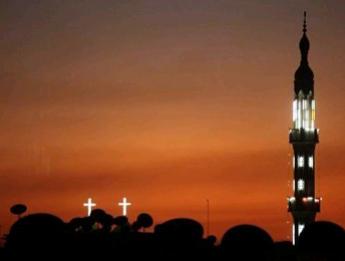 Dina Samir writes for EA:
Dina Samir writes for EA:
From the ringtones on the mobile phones of Cairo's underground riders --- chiming out the Islamic call to prayer or Christian worship songs --- to religious products such as Islamic books to the preaching of a Muslim lady in the women-only carriage, a stranger can hear and feel religion in the air. Just one ride gives you Egyptians’ “religious mania,” a term used by various intellectuals to refer to an obsession among many Christians and Muslims in Egypt.
On the Islamic front, the manifestations of religiosity are many, one of which is the spread of veil or hijabamong many Muslim women in Egypt. Though wearing the veil is theoretically a spiritual decision made by Muslim women in their efforts to be sacred and to get closer to God, it has become a cultural rather religious act for many . “It (hijab) has become sort of a national dress,” says Madiha el-Safty, a sociology professor at the American University in Cairo, arguing that “90 percent of Egyptian Muslim women now wear the veil”.
According to Islam, a veiled woman’s outer look should reflect simplicity and she should dress conservatively. However, some veiled women, especially the young, wear tight clothes that contradict the logic behind the veil. And there are other complexities: some young girls, especially among Muslim families from lower classes, get veiled at the age of 10 or even younger, though according to Islam a girl should first wear the hijab when she reaches puberty.
The role that mosques play in Egypt that now extend beyond that of prayer houses. In recent years, they have begun offering religious classes, summer school programs, youth camps, and trips. Religion becomes social.
The same is also true in among Egypt's Coptic Christians. “For many Christians in Egypt, the church does not only centralize their lives, but it has rather become their life,” notes Professor Magdy Guirguis. Besides the many social activities, the church possesses its own facilities, such as medical centers, sports facilities, and halls that can be rented for special occasions. Some of these facilities are offered free of charge, others for modest fees. This absorption of Christians in their churches is accompanied by a heavy consumption of Christian products and the Christian satellite TV programming.
And of course, politics and religion do not remain separate, as officials in Egypt used heavenly faith to gain earthly support.
Founded in 1928 to achieve religious objectives, the Muslim Brotherhood has become the most influential group linking the political and religious influential spheres. It calls for the establishment of the Islamic state, making Sharia (Islamic law) the source for legislation. It has used “Islam is the Solution” as their motto in the parliamentary elections. Although the Egyptian government refuses to legalize the group and restricts its activities, the Brotherhood is viewed by many Muslims as the “good guys”.
And the Government has also tried to benefit from the connections. President Sadat deliberately added a religious slant to his speeches and decisions through his presidency, not only to score points with the public but also to get rid of the leftists, who were considered a threat to his government and power. For example, instead of giving a prominent speech on 23 July, the date of the 1952 Egyptian Revolution, Sadat shifted it to El Mawled El Nabawi’s day (Prophet Mohamed’s birthday) to stir people’s religious identity.
In her book Egypt’s Culture Wars: Policies and Practices, Samia Mehrez noted that today's Mubarak Government has tried to sell a secular image to its global audience but displayed religious nationalism for its local counters. Guirguis also thinks that the increase of religiosity is also linkedto the concurrent religious strife and intolerance in Egypt among Christians and Muslims, as people turn from being observers to fanatics. “As a result of being oppressed (politically), people tend to oppress the other (who differs in religion),” he argues.
Egypt has witnessed incidents of sectarian strife in the last three decades. The most recent of these occurred on 6 January 2009 when an assault on the Coptic Christians' Mar Guirguis Church in Nagaa Hammadi, a city in Upper Egypt, led to the death of seven people. Occasional episodes of violence continue, with the Egyptian Government dismissing those committing them as “mentally handicapped".
Another common story is the marriage of Christian ladies, mostly in Upper Egypt, to Muslim men with their conversion to Islam. When these incidents take place, Christians accuse their Muslim neighbors of kidnapping women and force them into their religion.
In a recent incident, Camelia Shehata, the wife of a Coptic priest of a Church in an upper Egyptian city, escaped her husband’s house. Christians claimed Muslims were behind Shehata’s disappearance. Muslims subsequently demonstrated against the allegation.To contain anger, Shehata was featured in a video on YouTube, in which she started her monologue by making the Sign of the Cross and confirming her Christianity, refuting the “rumours” that she converted to Islam.
But why is religion all around? Professor Guirguis offers a challenging conclusion, “Since they cannot speak loud about political activism, corruption, inheritance of power, contemplating religion and football are the safe choices left for Egyptians.”